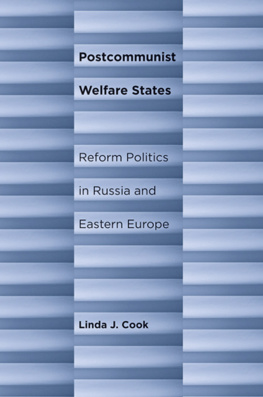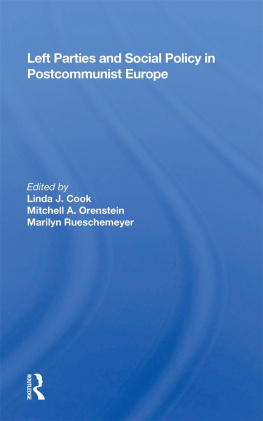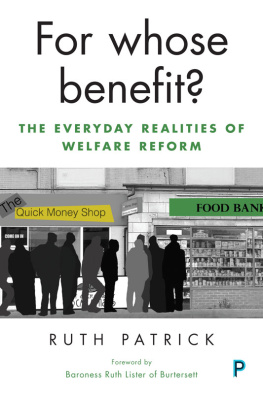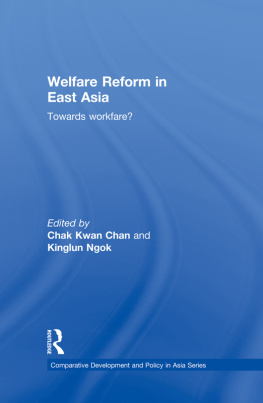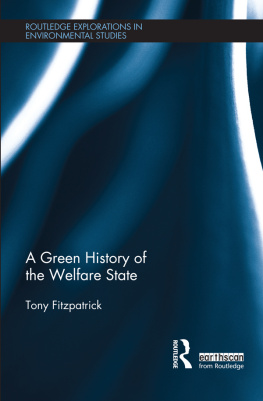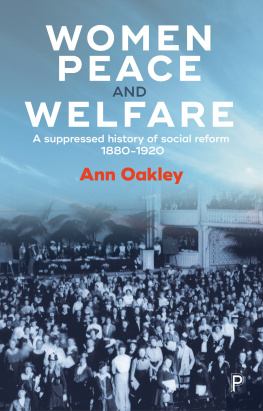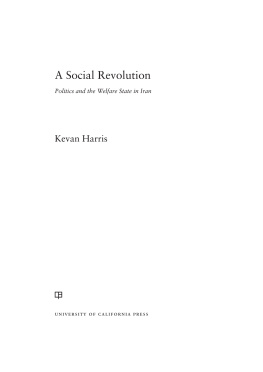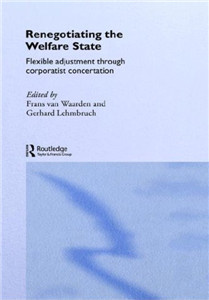Postcommunist Welfare States
Reform Politics in Russia
and Eastern Europe
Linda J. Cook
Cornell University Press
Ithaca and London
To
My Father, Roland A. Cook
and
the Memory of My Mother,
Anna L. (Herlihy) Cook
for their wisdom, support, and encouragement
always
Contents
Acknowledgments
This book is a product of years of research and study, and there are many people whose help and support I would like to acknowledge. First, I thank the social scientists in Moscow who have devoted their careers to studying Russias social sector and who gave generously of their expertise and time to explain a reality that was often obscured as much as revealed by documents and statistics. Much of what I have understood I owe to them. I thought it best not to identify interviewees individually, but I very much appreciate the knowledge and help of everyone who spoke with me over the course of the research, including those from the research community, and from the Russian government, the World Bank, and other organizations.
Many colleagues have contributed to this work. I especially want to thank Sarah Oates, Sarah Brooks, and Judyth Twigg for their generosity in providing research materials that would otherwise have been inaccessible. I also thank the following scholars for reading and commenting on various parts of the draft: Sarah Brooks, Michael Cain, Gerald Easter, Stephan Haggard, Robert Kaufman, Conor ODwyer, Mitchell Orenstein, Thomas Remington, Marilyn and Dietrich Rueschemeyer, Barney Schwalberg, Richard Snyder, Barbara Stallings, Janet Vaillant, Kurt Weyland, Jeanne Wilson, and two anonymous reviewers for Cornell University Press. I have tried to respond to their insightful comments and critiques, which have led to many improvements in the manuscript. The final product remains my responsibility entirely.
Several institutions supported the research for this book. Here I acknowledge especially my department at Brown University for providing leave time to work on the manuscript. A two-year working group on Globalization and the Welfare State, directed by Dietrich Rueschemeyer at Brown Universitys Watson Institute, provided a critical source of ideas and inspiration for the project. Crucial parts of the writing were accomplished during a year as a senior scholar at the Davis Center for Russian and Eurasian Studies at Harvard University, directed by Timothy Colton. The National Council for Eurasian and East European Studies and the International Research and Exchanges Board provided support for research time as well as numerous trips to Moscow and Washington, D.C. Parts of the research were presented at conferences or seminars at the Davis Center, the Watson Institute, the Mershon Center at Ohio State University, and the Wilson Center for Scholars in Washington, D.C. Several research assistants, who have since gone on to bigger and better things, provided invaluable help: Tanya Abrams, Sava Savov, Matthew Crosston, Catherine (Sam) Johnson, Andrew Matheny, Sean Yom, Anna Rasulova, and most especially Gavril Bilev, who prepared all the figures and without whose assistance I could not have finished the project.
Sincere thanks go to my editor at Cornell Press, Roger Haydon, whose interest in the project from the outset greatly encouraged me, to his extraordinary assistant, Sara Ferguson, and to Teresa Jesionowski, for her abundant help in the editing process. To my colleague and friend, Elena Vinogradova, who has been my host in Moscow and aided my work in countless ways throughout, I am deeply grateful.
As he has from the time we first met, my husband Dan encouraged me to inch along and has given his support generously in so many ways. My greatest pleasure while writing has been in seeing our son David grow from a child into a young man with great intelligence, integrity, and enthusiasm for life. Finally, the book is dedicated to my father and to the memory of my mother.
L.J.C.
Introduction
Welfare States and Postcommunist Transitions
The postcommunist transitions that altered the political and economic systems of the Soviet Union and Eastern Europe had dramatic effects on their welfare states. As these countries moved into market transformation and deep recession in the early 1990s, their inherited systems of broad, basic social provision became financially unsustainable and ineffective. Governments were caught between preexisting commitments to provide welfare for their populations and intense pressures to restructure their economies, cut social expenditures, and adopt more market-conforming welfare models. This book looks at how governments in Russia and four other postcommunist states responded to these conflicting pressures as their centrally planned economies collapsed and market economies began to emerge. It asks how welfare state change was negotiated through transitional recessions and subsequent economic recoveries, and it compares the outcomes for welfare state structures, expenditure levels, and provision of social services, insurance, and protections.
For postcommunist states and societies, a great deal was at stake. Communist-era social sectors were fully administered and financed by states, which had eliminated markets and alternative sources of social provision. State-funded social services such as health and education, although comparatively of low quality, were nearly universally available. Social insurance, subsidized housing, and myriad other benefits and transfer payments were provided to broad populations and privileged groups. Communist welfare states faced high demand, and they were chronically underfinanced. The situation had worsened significantly during the 1980s as economic growth across the region slowed and welfare performance deteriorated. Moreover, these welfare states were embedded in full-employment economies based on the centralized state planning and resource allocation that formed part of the communist developmental model. The transformation to market economies and privatization of production cut away their core by ending full-employment guarantees and greatly reducing states control over allocations. In addition, deep economic recessions affected postcommunist economies during the 1990s, calling for programs of fiscal stabilization and substantial cuts in welfare expenditures. At various points in the decade, economic recovery eased these financial pressures on governments, but for the most part the old welfare models were no longer viable.
At the same time that they faced strong economic and structural pressures to cut back on welfare, postcommunist governments confronted potentially high political costs for doing so. Here there were three major problems: populations were state-dependent, popular attachments to the welfare state were strong, and organized stakeholders favored its maintenance. Communist systems had allowed almost no accumulation of personal wealth, and most savings were eliminated by inflation in the early 1990s. Pensioners and other recipients of transfer payments depended on the statemost had no alternative sources of income. Moreover, postcommunist populations remained strongly attached to public provision, sharing a broad sense that the state was responsible for accustomed social services and entitlements. The governments in newly democratizing postcommunist states had to be concerned about a possible political backlash against welfare cuts that could threaten their power as well as the broader reform program. Third, communist-era welfare states had produced organized stakeholders, social-sector elites and welfare bureaucracies with vested interests in public administration and financing of social welfare. Powerful stakeholders could try to block reforms or press for compensation. While some parts of communist-era publics and social-sector elites had become critical of the old welfare system and supported reform efforts, many resisted changes.

